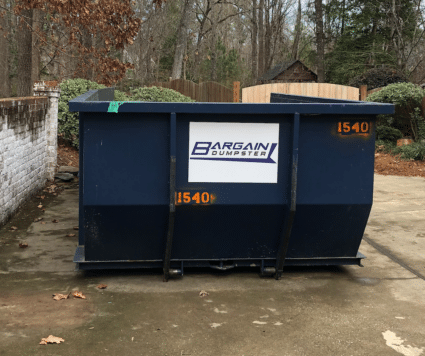Why Does Your Dumpster's Weight Matter?
Although your debris may fit within the container's volume, it's crucial to be mindful of the weight limit. For instance, a 10-yard dumpster filled with tree branches will be lighter than the same dumpster filled with broken concrete. Therefore, specific dumpster sizes can only be partially filled with heavier materials to remain within the weight limit.
Landfills assess disposal costs based on weight by the ton. Surpassing the dumpster's weight limit will incur a per-ton overage fee. Always take into account the type and weight of your materials when selecting a dumpster.
The Best Way to Use Our Dumpster Calculators
Utilize our calculators by inputting the relevant information into the fields and clicking "Estimate My Weight." The tool will then provide you with an estimated weight value for your debris in pounds and tons.
Once you have the weight estimate, use it to select the appropriate dumpster size when placing an order. If you're uncertain, feel free to give us a call. We'll customize your quote to assist you in choosing the right size and weight limit for your project.
Please note that our weight calculators are for estimation purposes and do not guarantee the exact cost of services. They are designed to offer an idea of the potential weight of your project debris. Keep in mind that these estimates may vary based on the specific materials you are disposing of.

WEIGHT CALCULATOR
How Much Does a Square of Shingles Weigh
You can approximate the weight of shingles by considering them in squares or bundles. Typically, three bundles of asphalt shingles are sufficient to cover one roofing square (equivalent to 100 square feet). A bundle of three-tab asphalt shingles typically weighs between 60 and 80 pounds, while a square weighs between 180 and 240 pounds.
Shingle weights may vary based on the quality and type of shingle. For instance, architectural shingles, when removed, usually weigh between 70 and 80 pounds per bundle, while slate shingles are substantially heavier, weighing between 250 and 350 pounds per bundle.
Explore our shingle weight calculator to determine the appropriate dumpster size for your roof tear-off or removal needs.
How Much Does Concrete and Asphalt Weigh?
Typically, a cubic yard of solid concrete weighs around 4,050 pounds (~2 tons) or 150 pounds per cubic foot. Solid asphalt is slightly lighter, weighing about 3,960 pounds per cubic yard. The weights of concrete and asphalt are determined by the material's square footage and thickness.
When broken concrete and asphalt are disposed of in a dumpster, they weigh approximately 2,025 pounds (~1 ton) per cubic yard or 75 pounds per cubic foot due to the additional empty space. Utilize our concrete weight calculator to select the appropriate dumpster for broken concrete and asphalt.
How Much Does Sheetrock & Drywall Weigh?
A solitary sheet of drywall measuring 4 feet by 8 feet and half an inch in thickness weighs approximately 50 pounds. Determine the weight of drywall, sheetrock, and plaster by considering the square footage of the debris and the material's thickness. If you're in the process of removing drywall, make use of our drywall weight calculator to gauge the weight and identify the suitable dumpster size for your project.
How Much Does Carpet Weigh?
The weight of carpet varies, ranging from 5 to 20 pounds per square yard or 0.5 to 2.2 pounds per square foot. This weight is influenced by the material and thickness of the carpet. Utilize the carpet weight calculator for a preliminary estimate when determining the weight of the carpet you're removing.
The weight of your dumpster significantly influences the cost, as landfills typically charge per ton. Once we collect your container, your debris is weighed at the landfill, and the cost is determined according to their fee structure. Simplify your budgeting with our flat-rate pricing, encompassing disposal costs for a specified weight limit. As long as you stay within that limit, you’ll have a clear upfront understanding of your expenses—no need to speculate or wait until your debris reaches the landfill. Although the typical dumpster truck has the capacity to carry around 10 tons or 20,000 pounds, weight restrictions commonly range from 2 to 6 tons or 4,000 to 12,000 pounds to ensure secure transportation. We’ll inquire about the items you’re discarding to assess the weight of your debris. This enables us to recommend the appropriate bin size for your project. Additionally, you can utilize our dumpster weight calculators for a preliminary estimate. Upon arrival at the landfill, the dumpster is weighed, and the process is repeated after the debris is emptied. The variance between these two weights is then employed to calculate the weight of your debris and determine the disposal cost. A ton equals 2000 pounds. Scrap metal weighs approximately 225 pounds.
Have any additional Questions?
Call us today and we would be happy to walk you through the rental process.
